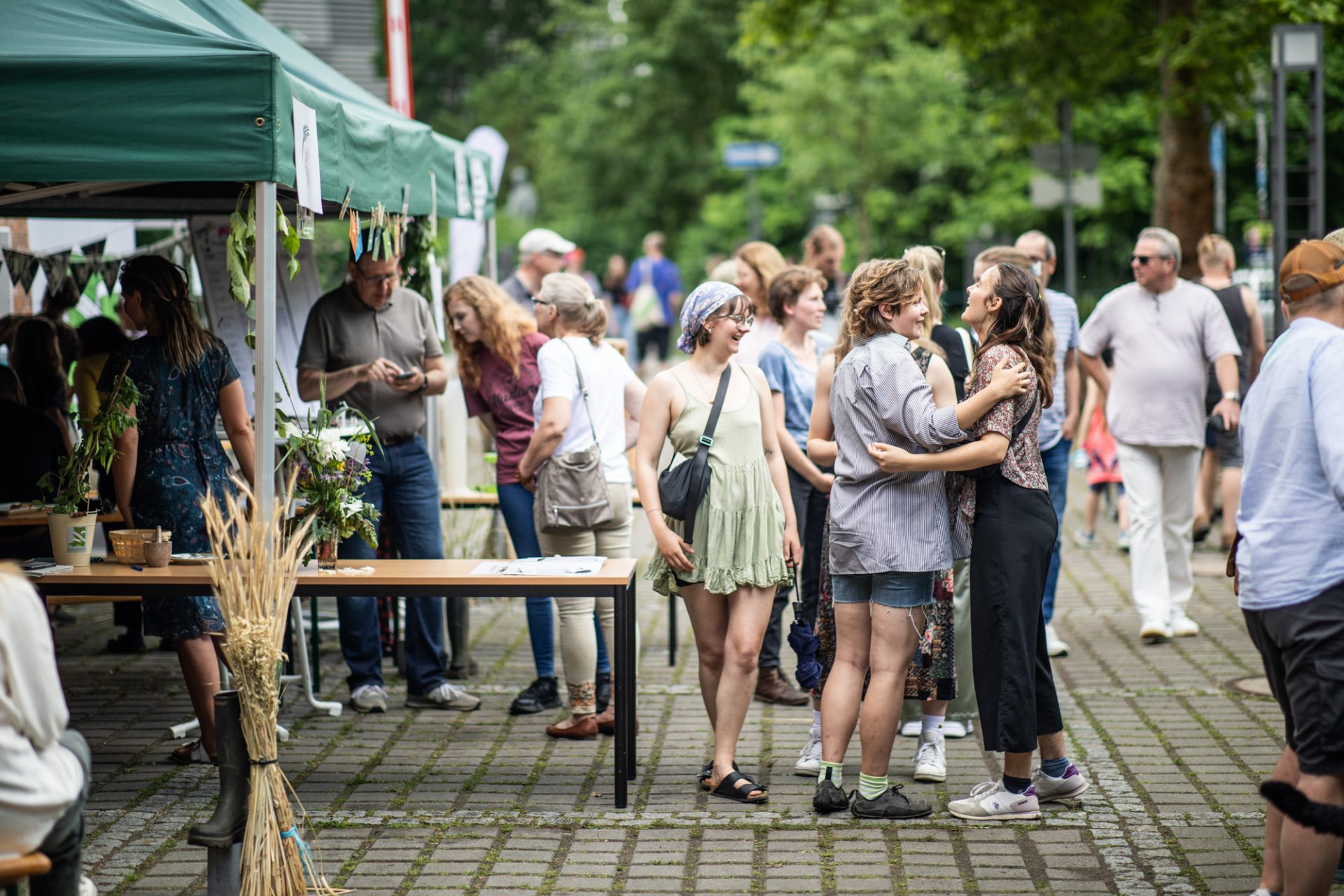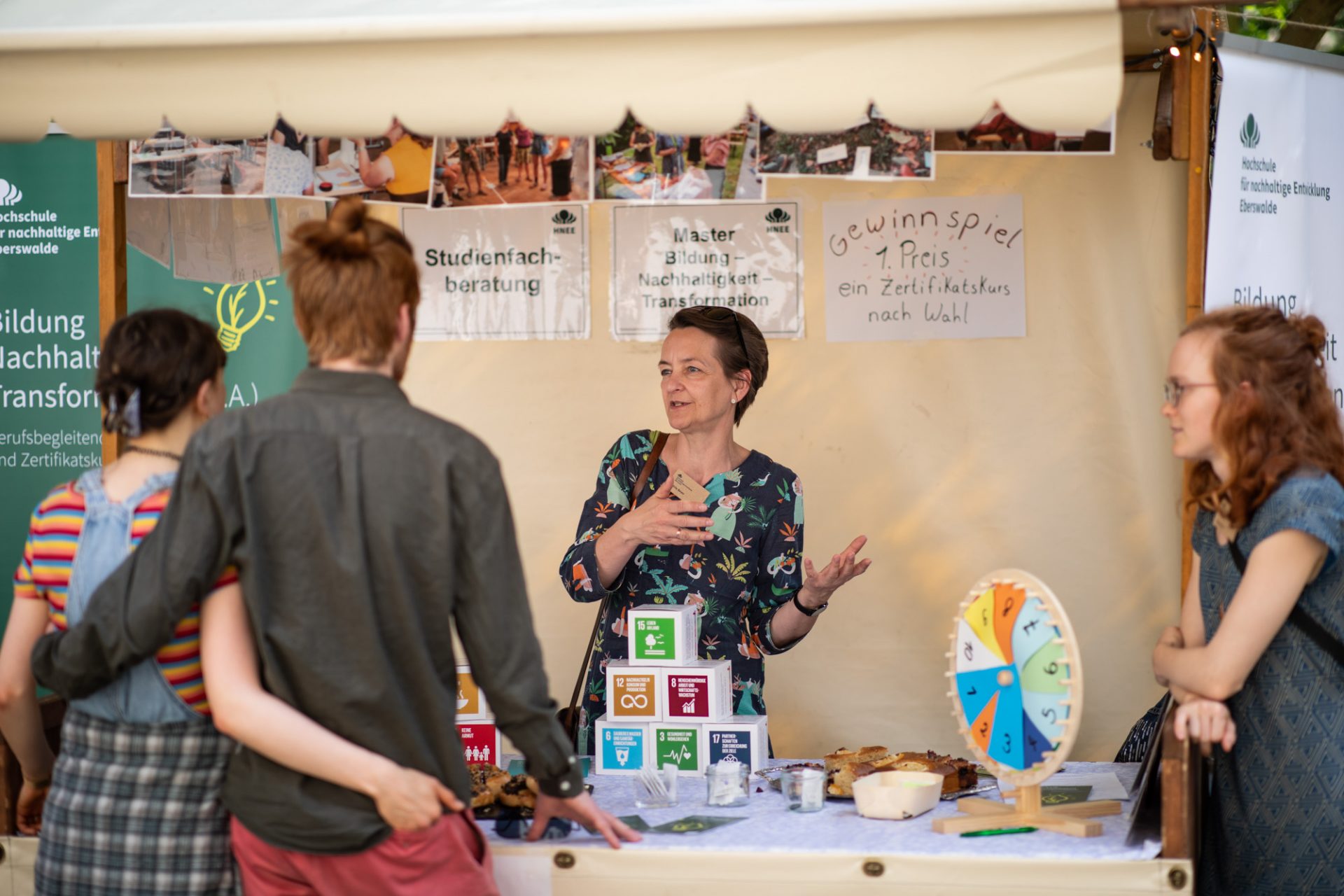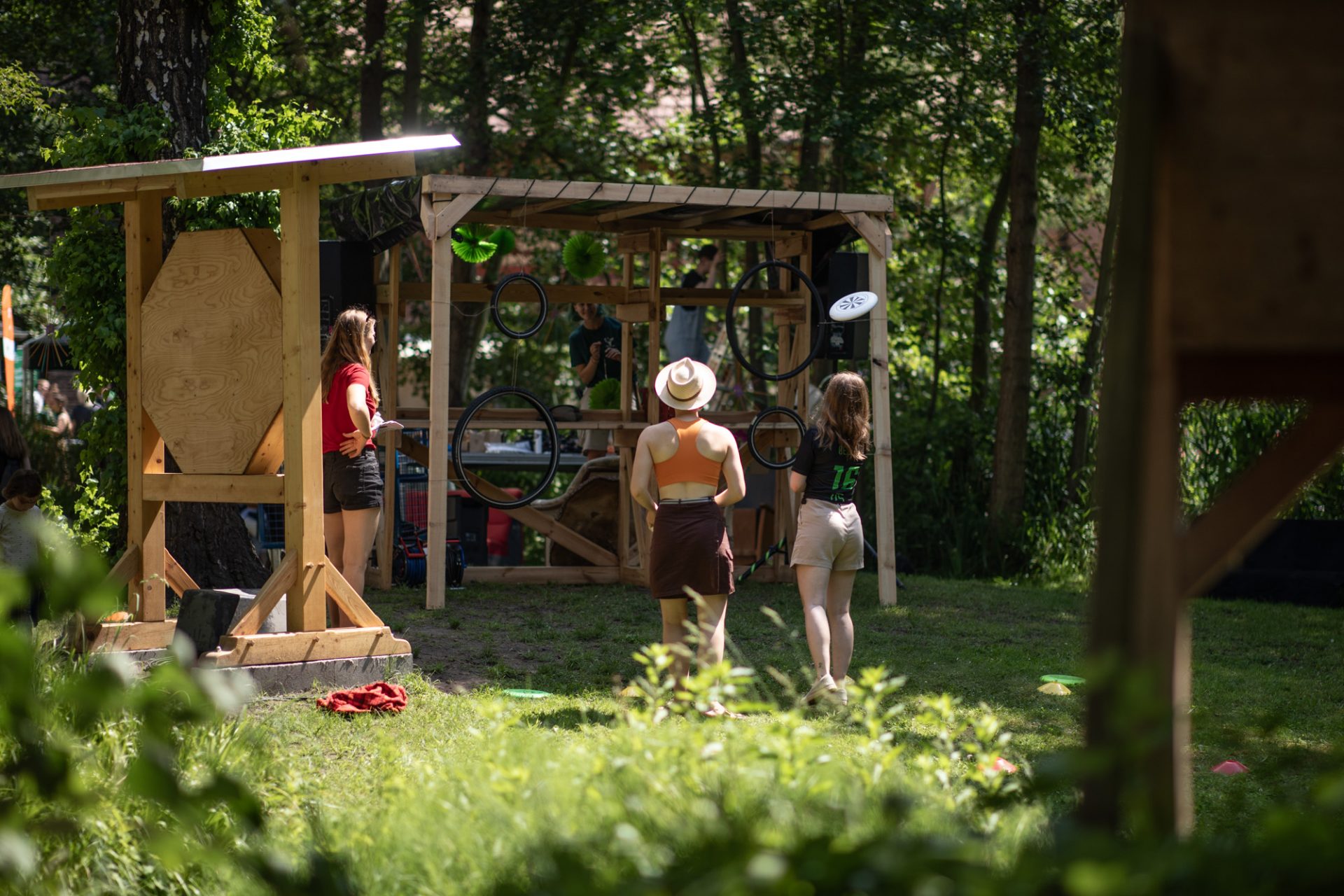Thank you for coming to our University Information Day on Saturday, 1 June 2024!
If you could not attend and still have questions, please write us: studieren@hnee.de
>> Also our new website is now online – have a look! <<
The perfect place to study!
Unique degree programmes, international orientation, practice-oriented teaching and an attractive university town, located in the middle of an extensive natural landscape and only about 30 minutes by train from the metropolis of Berlin – a university that is serious about sustainable development and appeals with a personal atmosphere between teachers and students. All this and much more is on offer at the Eberswalde University for Sustainable Development (HNEE). Discover our degree programmes below:
- All
- Bachelor
- Master
- English/International
Bachelor
Designing sustainable food and agricultural systems
Some of our planetary boundaries have already been exceeded. This is closely linked to how we produce and consume. Food production is of central importance here. The necessary transformation to a sustainable society requires people who shape change.
The Bachelor’s degree course in Sustainable Food and Agriculture (ErnA) helps you to understand the major challenges of our time. It offers a unique range of courses with technical, artistic and practical elements, and individual mentoring helps you to find a suitable profile for your studies and career. ErnA is the first Bachelor’s degree program to combine agriculture and nutrition with nature and resource conservation.
Organic Farming and Marketing
There is a growing demand for qualified specialists in the organic sector! The »Organic Farming and Marketing« study programme trains and empowers its students to assume position of responsibility in organic agriculture. This practice-oriented programme focuses on agricultural production methods according to the principles of organic agriculture and the organic food industry. This covers arable farming and crop production, animal husbandry and business management as well as processing and marketing. In doing so, programme covers the entire value-added chain.
Organic Farming and Marketing dual
Students on the dual course earn two qualifications: the vocational apprenticeship as an agriculturalist as well as the academic Bachelor’s degree.
Forestry
The Forestry programme qualifies students to sustainably manage and develop forests while taking their diverse range of functions into account. Students learn the fundamentals of natural sciences, gain technical know-how, and acquire economic skills such as operational planning and controlling as well as acquiring basic knowledge of human resources and business management.
Sustainable Economics and Management
(Renaming of the previous Bachelor’s programme “Sustainable Management” as of summer semester 2021)
Interested in running a sustainable, environmentally-friendly and socially-responsible business? Want to implement innovative ideas, be active and run your own company in a responsible manner or work with other economic players? The study programme “Sustainable Economics and Management” prepares students for their future careers, featuring diverse subject areas, practical applications and responsibility.
Landscape Management and Nature Conservation
The long-term, environmentally responsible development of land use is one of the pressing tasks of the 21st century. Our landscapes need nuanced, sustainable usage management, rooted in the local context while maintaining a global perspective. Interdisciplinary specialists with practical skills are required to overcome the challenges this presents. There is a need for dedicated experts who are able to perceive and analyse the landscape as a whole, thereby ensuring the preservation of its functioning and sustainable usage. We have made this our mission and been pioneers in Germany since 1993 with our study programme which responds to these demands.
Wood Engineering
Wood is one of the most sustainably produced raw materials. In addition to its traditional use as a material in load-bearing and cladding applications, wood can also be utilised thermally, materially and chemically. These diverse utilisation options have greatly increased the demand for this raw material in recent years against the background of creating sustainable products. This change in utilisation paths and the demand for high raw material efficiency has technological consequences that are changing the tasks of engineers in this field. This requires competent, highly qualified specialists. After successfully completing a Bachelor’s degree in timber engineering with a specialisation in “Structural Engineering” or “Wood Technology”, there are a wide range of career prospects in this up-and-coming and modern industry. In addition to the qualification for a subsequent Master’s programme, the Bachelor’s degree enables direct career entry into engineering activities. A good thesis often leads to the first job offer.
Wood Engineering dual
Wood processing trades increasingly feature methods from engineering sciences. To meet the demand for specialists in the branch, the Faculty of Wood Engineering offers the programme »Wood Engineering« as a dual degree. The programme combines the practical apprenticeship with the Bachelor’s degree in Wood Engineering. The student and their apprenticeship company both benefit from the complimentary knowledge in scientific engineering and practical skills. After completing the programme, students have excellent prospects as engineers in a wide range of professions along the entire value-added chain of wood as well as in related sectors.
International Forest Ecosystem Management
Around the world, humans are facing the mounting challenge of sustainably managing our forests and natural resources as well as protecting them as the basis of life. As a result, there is growing demand for ecosystem managers with skills required to work in international contexts and apply holistic approaches. Our programme »International Forest Ecosystem Management« is one of the few study concepts around the world oriented toward tackling these challenges.
Master
Sustainable Regional Development: Education-Management-Nature Conservation
(Reacredited degree programme, offered until the winter semester 2020/21 under the name “Regional Development and Nature Conservation”)
The Master’s programme ” Sustainable Regional Development: Education-Management-Nature Conservation ” is ideal for graduates of ecologically oriented Bachelor’s programmes looking to deepen their knowledge. It offers three specialisation pathways: a) the specialisation “Environmental Education / Education for Sustainable Development (ESD)”, b) the specialisation “Biodiversity Management in the Cultural Landscape” and c) “Individual Profilling”.
Organic Farming and Food Systems
In Germany, the organic market is booming. Both the food retail trade and discount shops are focusing on the growing organic sector. The result: significante organic companies are searching for the next generation of managers. Our study programme “Organic Farming and Food
Systems” responds to the demand for managers in the German-speaking organic sector. In addition to business management, students become familiar with the current trends in ecological agriculture and the food industry. Students discover how to perform quality assurance and food product processing on a sustainable basis and how to market organic products.
Sustainable Tourism Management
Tourism has the potential to sustainably promote regions, generate income and open up new adventures and experiences for travellers. However, it also consumes resources, harms the environment and can lead to cultural exploitation and social inequalities. This is where the Master’s programme »Sustainable Tourism Management« comes in. Open to graduates with Bachelor’s degrees in fields relating to tourism, economics or geography, students learn how tourism has to be planned and organised if it is to achieve a balance between economics, ecology and social issues.
Sustainable Business Management
Many companies use sustainability to gain a competitive advantage. This way, they open up new markets and respond to the demands from citizens and politics. This has resulted in an increasing demand for specialists and managers who can leave the well-trodden paths behind and bring fresh perspectives and solutions. In the Master’s programme »Sustainable Business Management«, students learn to develop ideas which put sustainability at the heart of business practice.
Wood Engineering
In the research-oriented Master’s programme “Wood Engineering”, much of the learning process and knowledge transfer takes place through its integration into current research work. Individually or in teams of scientists and students, the students explore clearly defined questions pertinent to wood engineering or processing technology.
Global Change Management
Shape change! Unsustainable land use, rampant urbanisation, infrastructural development and anthropogenic climate change are impairing the functioning of our global ecosystem – and thus the basis for human life. If we are to initiate and manage the necessary transformation processes in our society, we need skilled people who are able to perform a systemic analysis of our global ecosystem and its threats, but who also bear future risks and scenarios in mind. They have to be able to derive suitable strategies for sustainable development based on the analysis of the problem.
Forestry System Transformation
The Master’s programme »Forestry System Transformation« (FST) is oriented toward a modern forest ecosystem management adapted to the social and ecological challenges of the future. It aims to use innovative political and economic instruments, strategies and evaluation methods which expand and sustainably promote the range of forest ecosystem services.
Biosphere Reserves Management
Learn to bring humans and nature together on a global scale through model regions! The international Master’s programme Biosphere Reserves Management (M.Sc.) equips students with the skills to effectively manage, support and develop biosphere reserves.
Education – Sustainability – Transformation
Transformation requires action and actors. But how do we inspire people to act sustainably? In the Master’s programme “Education – Sustainability – Transformation”, studied alongside work, students tackle the complex subject of sustainability and humans from the perspective of the active, intiating person in the transformation process. Students develop their interdisciplinary and transdisciplinary thinking skills and awareness of responsibility, enabling them to communicate and carry out sustainable transformation processes. For this, they require specialist competences to recognise and analyse complex relationships while taking into consideration the dimensions of sustainability. In this programme, students gain an insight into the human psyche and acquire pedagogic and didactic skills to motivate and empower other people to shape and support change.
Strategic Sustainability Management
Become an agent of change! The fee-based further education course »Strategic Sustainability Management«, studied alongside work, equips students with the skills to initiate and drive forward sustainability processes in companies and non-profit organisations. Students develop future-oriented solutions for everyday working life in discussion with renowned sustainability experts from academia and practice and in groups with other students.
Forest Information Technology
Information technologies are a key technology of the 21st century. Sustainable forest management therefore requires skilled experts who have been specially trained in the application of modern information technologies (IT) for the forest and environment sectors. Offered in partnership with the Warsaw University of Life Sciences (Poland), the »Forest Information Technology« programme equips students with precisely these skills.
English/International
Sustainable Tourism Management
Tourism has the potential to sustainably promote regions, generate income and open up new adventures and experiences for travellers. However, it also consumes resources, harms the environment and can lead to cultural exploitation and social inequalities. This is where the Master’s programme »Sustainable Tourism Management« comes in. Open to graduates with Bachelor’s degrees in fields relating to tourism, economics or geography, students learn how tourism has to be planned and organised if it is to achieve a balance between economics, ecology and social issues.
Global Change Management
Shape change! Unsustainable land use, rampant urbanisation, infrastructural development and anthropogenic climate change are impairing the functioning of our global ecosystem – and thus the basis for human life. If we are to initiate and manage the necessary transformation processes in our society, we need skilled people who are able to perform a systemic analysis of our global ecosystem and its threats, but who also bear future risks and scenarios in mind. They have to be able to derive suitable strategies for sustainable development based on the analysis of the problem.
Forestry System Transformation
The Master’s programme »Forestry System Transformation« (FST) is oriented toward a modern forest ecosystem management adapted to the social and ecological challenges of the future. It aims to use innovative political and economic instruments, strategies and evaluation methods which expand and sustainably promote the range of forest ecosystem services.
Biosphere Reserves Management
Learn to bring humans and nature together on a global scale through model regions! The international Master’s programme Biosphere Reserves Management (M.Sc.) equips students with the skills to effectively manage, support and develop biosphere reserves.
Forest Information Technology
Information technologies are a key technology of the 21st century. Sustainable forest management therefore requires skilled experts who have been specially trained in the application of modern information technologies (IT) for the forest and environment sectors. Offered in partnership with the Warsaw University of Life Sciences (Poland), the »Forest Information Technology« programme equips students with precisely these skills.
Bachelor
International Forest Ecosystem Management
Around the world, humans are facing the mounting challenge of sustainably managing our forests and natural resources as well as protecting them as the basis of life. As a result, there is growing demand for ecosystem managers with skills required to work in international contexts and apply holistic approaches. Our programme »International Forest Ecosystem Management« is one of the few study concepts around the world oriented toward tackling these challenges.





